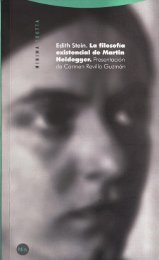The Collected Works of EDITH STEIN ON THE PROBLEM OF EMPATHY
Create successful ePaper yourself
Turn your PDF publications into a flip-book with our unique Google optimized e-Paper software.
105><br />
Edith Stein<br />
absolutely as the scientific ideal. This would be harmless if this<br />
interpretation were confined to natural scientists. One could<br />
calmlv allow them the satisfaction <strong>of</strong> looking down on "unscientific"<br />
(because not "exact") cultural science, if'the enthusiasm for<br />
this method had not gripped cultural scientists themselves. People<br />
do not want to be inexact and so cultural sciences have gone<br />
along in man), $'ays and have lost sight <strong>of</strong> their own goals. We find<br />
the psychological interpretation <strong>of</strong> history'r6 advocated in the<br />
textbooks on historical method. <strong>The</strong> study <strong>of</strong>'this interpretation<br />
is emphatically recommended to ]'oung historians by Bernheim,<br />
for example, who ranks as an authority in the area <strong>of</strong> methodology.<br />
\4'e certainly do not maintain that psychological findings can be<br />
<strong>of</strong> no use at all to the historian. But they help him find out n'hat is<br />
beyond his scope and do not yield him his real objectives. It is<br />
necessary for me to explain psychologicallv when I can no longer<br />
understand.rrT But when I do this, I am proceeding as a natural<br />
scientist and not as an historian. If I ascertain that an historical<br />
personality shou'ed certain psychic disturbances as the result <strong>of</strong><br />
an illness, for example a loss <strong>of</strong> memory, I am establishing a<br />
natural event <strong>of</strong> the past. This is an historical occurrence as little<br />
as the eruption <strong>of</strong> Vesuvius that destroyed Pompeii. I can account<br />
for this natural event by laws (assuming that I have such laws), but<br />
it does not thus become in the least intelligible. <strong>The</strong> only thing<br />
that one is tcl "understand" is hon, such natural events motivate<br />
the conduct <strong>of</strong> these people. <strong>The</strong>y have historical significance as<br />
"motives." But then one is no longer interpreting them as natural<br />
facts to be explained by natural laws. Should I "explain" the<br />
u'hole life <strong>of</strong> the past, I would have accomplished quite a piece <strong>of</strong><br />
work irr natural science, but rvould have completelv destroyed the<br />
spirit <strong>of</strong> the past and gotten not one graiu oi historical knowledge.<br />
If historians take their task to be the determination and<br />
explanation <strong>of</strong> the psychological facts <strong>of</strong> the past, there is no<br />
longer any historical scrence.<br />
Dilthey calls Taine's historical works a horrible example <strong>of</strong> the<br />
results <strong>of</strong> this psychological interpretation. Wilhelm Dilthey's<br />
goal in life was to give the cultural sciences their true foundation.<br />
He stressed that explanatorv psychology was not capable <strong>of</strong> this<br />
Ernpathy as the Understanding <strong>of</strong> SpirituaL Persons 95<br />
and rvanted to put a "descriptive and analytic psychology" in its<br />
place.rr8 \4Ie believe that "descriptive" is not the proper u'ord, fbr<br />
descriptive psychology is also the science <strong>of</strong> the soul as nature.<br />
Such a psychology can give us as little informatiorr on ho.rv the<br />
cultural sciences proceed as on the procedure <strong>of</strong> natural science.<br />
Phenomenology urges that reflecting investigation <strong>of</strong> this scientific<br />
consciousness make clear the method <strong>of</strong> cultural science as<br />
n'ell as that <strong>of</strong> natural science. Dilthey is not completely clear<br />
here'.<br />
Indeed, he also sees "self consciousness" as the way to an epistemological<br />
grounding.lre And he recognizes reflective turning<br />
o{'the glance toward the procedure <strong>of</strong> the cultural sciences to be<br />
the understanding that makes it possible for us to relive the<br />
spiritual lif'e <strong>of</strong> the past.r20 (We would call this empathic comprehension.)<br />
But he finds man as nature or rhe total life <strong>of</strong> the<br />
psvcho-phl,sical individual to be the subject <strong>of</strong> this undersrand- <br />
ing.t:lt <strong>The</strong>refore, the science occupied rvith human beings as<br />
natllre, i.e., descriptive psychology, is the presupposition <strong>of</strong> the<br />
cultural sciences on the one hand, and on the other hand, what<br />
gir,'es them unity; Ibr cultural sciences are concerned r,r'ith the<br />
single ramifications exemplifying this totality as a rvhole. <strong>The</strong>se<br />
include art, morality, law, etc.<br />
But nou' the principal difference bet.w'een nature and spirit has<br />
been suspended. Exact natural science is also presented as a unity.<br />
Each one <strong>of</strong> these sciences has an abstract Dart <strong>of</strong> the c

















